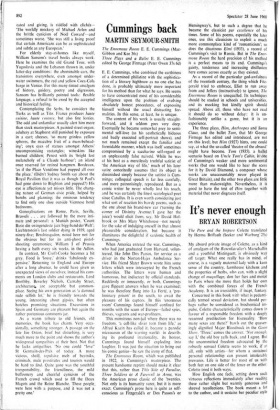Old friends
PETER VANSITTART
My Friends Wizen Young Brigit Patmore edited by Derek Patmore (Heinemann 35s) Grand Tour Today William Sansom (Hogarth 30s) The Ghost of June Rupert Croft-Cooke (W. a Allen 35s) Amateur books about writers generally promise gratuitous name-dropping, malicious gossip, perfunctory judgments. Auden remarks that one can't review a bad book without showing off: the same can apply to writing the book itself. But in Mrs Patmore's posthumous memoirs, unpretentious, occasionally naive or platitudinous, genuine feelings shine through, notably charity. Without a firm talent herself, she was friend to all. Ezra Pound dedicated Lustra to her: Richard Aldington, for ten years her lover, A Dream in the Luxembourg. In Aaron's Rod she is Clarissa Browning. She knew Hemingway, Wells, Yeats.
'I have always been drawn most closely to people who were under a spell. The bewitch- ment might be sorrow or the unending search for the creative spirit. People haunted by sounds or words—especially words—were irre- sistible to me, and 1 liked best to meet them at the beginning of their search, when frus- tration made them silent or a frenzy of hope made them voluble.' There is a i'Ympathetic sketch of the first Mrs T. S. Eliot, whose hus- band provokes almost the only sharpness. The young Brigit was shocked by his snobbishness, reverence for a couple 'exclusive and supremely cultivated,' by his arrogance, despite his public insistence on humility, and by his loVing not only his own pain but that of others.'
Elsewhere she finds mellowness in unek- pected places : in Sir George Sitwell (*Ginger); in the dying D. H. Lawrence, gentle and compassionate; in Norman Douglas. She fur- ther confirms Pound's unending generosity to fellow artists; how often one finds his shrillest revilers have themselves less generosity than a nuthatch! Comedy Occurs. Pound's eccentric dancing; Yeats admiring Rossetti, 'There are those unforgettable words, which I can't re- member.' Hints of personal sadness intervene when superficiality threatens. She herself was unhappily married. 'Life is to those who love.' 'We begin to live when we have conceived life as a tragedy.' Her son's introduction, which covers the salient facts of a life both dedi-
cated and giving, is riddled with cliches— The worldly mockery of Michael Arlen and the brittle cynicism of Noel Coward'—and sometimes worse. 'She was still a living proof that certain Americans can be as sophisticated and subtle as any European.'
For elderly stay-at-homes like myself, William Sansom's travel books always work. Here he examines the old Grand Tour, with Yugoslavia and the Lebanon thrown in, under latter-day conditions: the abominable cars, the transistors everywhere, even amongst under- water swimmers, the red and yellow Coca-Cola barge in Venice. For this many-tinted amalgam of history, guidery, poetry and digression, Sansom has brilliantly pointed tools: flexible language, a refusal to be awed by the accepted and historical feeling.
Contemplating the Serbs, he considers the Turks as well as Tito. France produces haute cuisine, haute couture, but also fine lorries. The odd and unfamiliar usually alert him more than stock masterpieces. A painted street-organ; adultery at Staphorst still punished by exposure in a cart; cheeses, `so many grinless yellow spheres, the macabre fruit of a mass-behead- ing'; onyx eyes of statues amongst Athens' uncompromising rectangles; wineskins like burned children; Perost with its 'bright lost melancholy of a Claude harbour'; an island once reserved for retired hangmen. Bordeaux, 'as if the Place Vendome had pupped all over the place.' (Didn't Sydney Smith say about the Royal Pavilion that it was as though St Paul's had gone down to Brighton and pupped?) His eye is affectionate yet misses little. The chang- ing nature of German civic pride, helped by bombs and planning; the ominous tendency to find only one shoe outside Viennese hotel bedrooms.
Generalisations on Rome, Paris, Seville, Brussels . . . are followed by the more inti- mate and personal : a Munich poster, 'Count Basic die swingendeste jazz bigg-band der Welt'; Liechtenstein's last soldier dying in 1939, aged ninety-five; Berchtesgaden, noted here not for the obvious but for its anti-ghost pistol- shooting ceremonies; William I of Prussia having a bath every six weeks, in the Adlon.
In contrast, Mr Croft-Cooke becomes a bit grey. Food is 'lousy,' drinks 'fabulously ex- pensive.' Returning to England and Europe after a long absence, he could have given us unexpected views of ourselves; instead his com- ments on London clubs and restaurants, Lord Boothby, Beverley Nichols, Carnaby Street, architecture. are acceptable but common- place. Seeing his own generation as 'a damned rude selfish lot,' he is friendly towards the young, interesting about gipsies, but often botches promising situations. Excursions in Spain and Germany are pleasant but again the rather portentous comments jar.
As a warm tribute to old friends, old memories, the book has charm. Very occa- sionally, something stronger. A passage on the late Joe Orton, brief but disturbing, is very much more to the point and shows the author's widespread sympathies at their best. Not that he lacks antipathies. 'No one could "love" St Germain-des-Pres of today. A more vicious, shrill, repulsive, mob of beatniks, criminals, male prostitutes and tourists would be hard to find. Quite gone was the youthful irresponsibility, the friendliness,. the mild buffoonery and cheerful cynicism of the French crowd which used to fill the Deux Magots and the Reine Blanche. These people_ were here with a purpose, and it was not a pretty one.'



















































 Previous page
Previous page